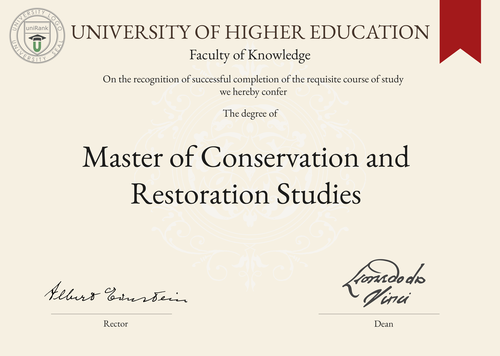
Master of Conservation and Restoration Studies (MCRS)
Guide to Master of Conservation and Restoration Studies Program/Course/Degree
Master of Conservation and Restoration Studies (MCRS)

Program Name:
Master of Conservation and Restoration StudiesProgram or Degree abbreviation:
MCRSDuration range:
Varies by country and university, typically 1-2 yearsTuition range:
Varies by country and university, typically $10,000-$30,000 per yearOverview:
The Master of Conservation and Restoration Studies program is designed to provide students with advanced knowledge and skills in the field of conservation and restoration of cultural heritage. This interdisciplinary program combines theory and practical training to equip students with the expertise needed to preserve and restore artworks, artifacts and historical structures.Curriculum Overview by year:
The curriculum is structured to cover various aspects of conservation and restoration studies. In the first year, students typically study foundational courses such as art history, materials science and conservation ethics. The second year focuses on specialized courses related to specific conservation areas, such as paintings, sculptures, textiles, or architectural heritage. Students also engage in hands-on practical training and may have the opportunity to participate in conservation projects.Key Components:
The key components of the program include theoretical knowledge, practical skills, research methods and ethical considerations in conservation and restoration. Students learn about different conservation techniques, documentation methods and preventive conservation measures. They also develop skills in scientific analysis, conservation treatment and project management.Career Prospects:
Graduates of the Master of Conservation and Restoration Studies program can pursue careers in various cultural heritage institutions, such as museums, galleries, archives and historic preservation organizations. They can work as conservators, restorers, conservation scientists, or conservation project managers. There is a growing demand for professionals in this field, both in the public and private sectors.Salary Expectations:
Salary expectations for graduates can vary depending on factors such as the country, location, level of experience and the specific job role. In general, conservation and restoration professionals can earn a competitive salary, with entry-level positions starting around $40,000 per year and experienced professionals earning upwards of $80,000 per year.Conclusions:
It is important to note that the duration, tuition fees, curriculum, key components, career prospects and salary expectations of the Master of Conservation and Restoration Studies program can vary depending on the chosen country or location of study, as well as the chosen university. Prospective students are advised to research and compare different programs to find the one that best suits their needs and goals. Visitors can search for where this specific degree, MCRS, is offered anywhere in the world through the uniRank World Universities Search Engine.World Universities Search Engine
search for Master of Conservation and Restoration Studies (MCRS) and add the Location (country, state etc.) or specific University you are interested in studying at.
Query examples:
- Master of Conservation and Restoration Studies (MCRS) United States
- Master of Conservation and Restoration Studies (MCRS) United Kingdom online
- Master of Conservation and Restoration Studies (MCRS) Australia international students
- Master of Conservation and Restoration Studies (MCRS) University of California
- Master of Conservation and Restoration Studies (MCRS) University of London tuition fees
- Master of Conservation and Restoration Studies (MCRS) University of Sydney scholarships
Share Program/Course
Interesting? Share this program/course/degree info with your friends now.